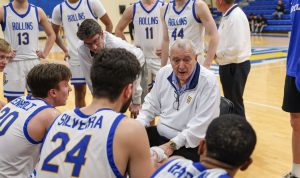
For newer students in the business department, securing an in-major adviser has been anything but business as usual.
Dr. Amy Armenia, associate dean of Academic Advising, said that the college is experiencing capacity issues for students who want an adviser in the business division. The number of faculty available to take on advisees does not fully meet the demand from students, leaving some students without an adviser in their major to help them navigate the complexities of their major requirements.
Armenia, alongside Dr. Tres Loch, director of Business Advising, is taking action to remedy the situation. Armenia said there is “no such major” where students who declare cannot get an adviser. Rather, the process takes some time as the Office of Academic Advising works to make sure demand is met.
“We have a process by which we take declared majors who want a business division adviser and prioritize them by seniority and get them moved over as soon as we can,” Armenia said. “My expectation is that we are going to be able to get all of the declared [business] majors who are in the second half of their sophomore year and above to a division [adviser] this semester.”
Armenia also said that Loch provides group advising sessions for students who don’t have a business adviser yet. She said that these sessions are also helpful for students who are undeclared but exploring the field.
Armenia added that all Rollins College Conference (RCC) professors are trained to provide full advisory services throughout a student’s second year at Rollins, at which point students are required to declare a major. RCC professors teach the first-year course every student is required to take to acclimate themselves to the college. RCC professors serve as their students’ adviser until they choose an adviser in their major.
For students who decide their major earlier, they may declare prior to the end of their second year. Armenia recommended all students who can declare early should, “because that’s what puts them on our radar for them needing an adviser. Before they do that, we don’t know they’re out there.”
In order to declare a major, Armenia said that students must complete two courses on the major map and two courses in other divisions. All majors are divided into one of six academic divisions, including Humanities, Expressive Arts, Social Sciences, Social Sciences – Applied, Business, and Sciences.
Armenia said that the majority of students who are expressing concern are first-year students who are “eager to get to a major adviser.” Armenia asked that those students “have some patience” because they “intentionally have delayed major declaration until they’ve taken a couple of classes because we want students to understand that they haven’t committed yet.”
Armenia said that students in need of a business adviser should make use of the “Exploring-X” declaration on Foxlink and consult with Loch or Armenia if they need additional help. By doing this, the Office of Academic Affairs is better able to understand the number of available advisers they will need for the future and plan accordingly.
Staffing shortage at Rollins
Staffing at Rollins has faced challenges since the start of the pandemic in March 2020, according to Provost Susan Singer. As of May 31, 2020, Rollins reduced the size of its staff and non-tenure track faculty significantly and was not actively searching to fill roles left open by the departure of faculty. Tenure is a permanent position in the faculty that grants recipients greater job security.
Singer, however, excitedly reported that the curriculum committee met on Jan. 31 to approve the ability for the more faculty to be hired with the ability to work towards tenure. The curriculum committee’s approval means the measure will now be reviewed by the Dean’s office, President’s Office, and Singer’s office as Provost.
Reopening some tenure lines does not necessarily correlate with an increased business faculty. Each department’s faculty must first present a case as to why their department should earn another tenured line. Further, the faculty and administration must compare data on course loads, contributions to general education, and more. All of these factors influence the decisions regarding which department(s) can get another line.
“It’s like a very complicated chess board,” Singer said.
Resources for Students
For students who are seeking support in declaring majors or finding advisers, the following resources are available:
- Department of Academic Advising – Information on all advising needs, including advisers, major/minor declaration, and course add/drop
- Email Dr. Amy Armenia, associate dean of Advising: aarmenia@rollins.edu
- Email Dr. Tres Loch, director of Business Advising: tloch@rollins.edu
- Foxlink Major Declaration Request
- Under Registration and Registrar tab
- Can declare majors or majors that are being explored
- RCC Adviser – trained to provide advising through the end of a student’s second year







Comments are closed.